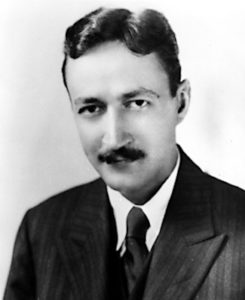
N. Jean Toomer
Nathan Toomer was born on this date in 1894. He was a Black writer.
Nathan Eugene Pinchback Toomer was the son of Nathan Toomer, a Georgia farmer, and the former Nina Pinchback, the daughter of the first Black governor in the United States. A Mulatto, Toomer passed for white despite his Black heritage and lived in both Black and white society before he was 18. When he moved to New Rochelle, N.Y., in 1906, he lived in a white neighborhood and attended a white school. Three years later, in Washington D.C., he attended an all-Black high school. He was raised in his grandparents' home after his father deserted his mother when he was a year old, and his mother died in 1909.
Jean Toomer, his adopted name, found his way back to New York, wherein, in the 1910s and 1920s, he was nurtured as a writer among the Greenwich Village progressive artists. It was while living in Sparta, Georgia, in 1921 that Toomer conceived the idea of "Cane," a work some compare to "Native Son" or "Invisible Man" in its impact on contemporary Black culture. He served a two-month stint as a substitute principal at the Black Sparta Agricultural and Industrial Institute.
Entranced by Georgia's rural geography and Black folk traditions, he saw harmony in Southern life that had escaped him. He believed Black culture was disappearing through migration to the North and its encounter with modernity. "Cane is a series of vignettes whose narrative structure moves from the South to the North and back to the South, forming a troubled synthesis of the two regions.
Members of the Harlem Renaissance and the Black Arts Movement, as well as later Black women writers, have cited its influence and acclaimed the author's sensitive treatment of Black folklife, formal elegance, and progressive, uninhibited approach to sexuality and gender. "Cane" was Jean Toomer's only work as a novel. After its publication, he disappeared from literary circles. In 1924, the restless author made the first of several pilgrimages to Fontainebleau, France, to study at the Institute for the Harmonious Development of Man.
He taught philosophy in Harlem and Chicago until the mid-1930s. Toomer wrote voluminously until his death, and although much of his writing received occasional praise for its experimentation, Blacks largely dismissed it. In 1930, Toomer declined to be included in James Weldon Johnson's "Book of American Negro Poetry" because he wasn't a Negro.
Toomer continued to strive for a sense of wholeness, however, and for a definition of what Henry Louis Gates Jr. has described as a "remarkably fluid notion of race.” He found this potential of an "American" race, described in the 1936 long poem "Blue Meridian," the last work published while he was alive.
Jean Toomer went on to become a Quaker. He died on March 30, 1967, after a long illness.
The Poetry of Black America
Anthology of the 20th Century.
Edited by Arnold Adoff, introduction by Gwendolyn Bennett
Copyright 1973, Harper Collins Publishers
ISBN 0-06-020089-8